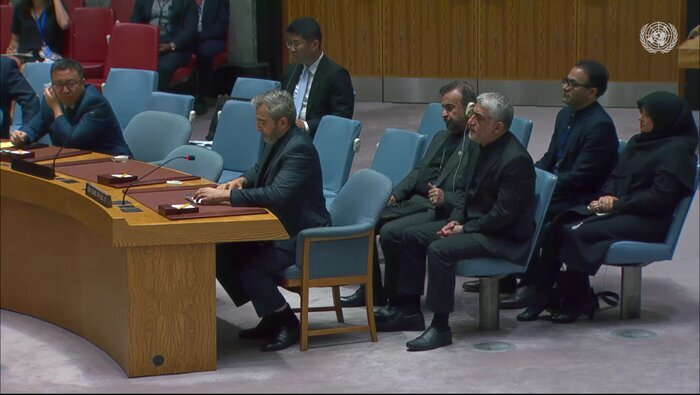Iran committed to multilateralism and international cooperation: acting FM

TEHRAN – On Tuesday, Iran's acting Foreign Minister, Ali Baqeri Kani, delivered a speech at the United Nations Security Council, underscoring the incoming Iranian administration’s foreign policy focus on multilateralism.
He stated that President-elect Masoud Pezeshkian has committed to expanding Iran's friendly relations with other nations through dialogue, cooperation, equality, and mutual respect.
Speaking at a session titled "Multilateral Cooperation in the Interest of a More Just, Democratic and Sustainable World Order" Baqeri reiterated that the Iranian government's foreign policy is firmly rooted in the principles of the UN Charter and international law. He highlighted the importance of multilateralism as a cornerstone for addressing global threats and challenges, advocating for a safe, just, and inclusive environment where all nations can thrive.
Baqeri pointed to the Joint Comprehensive Plan of Action (JCPOA) as a prime example of Iran's dedication to multilateral efforts. He lamented the setbacks caused by the United States' unilateral withdrawal from the agreement, calling it a detrimental move that disrupted international cooperation and harmed all parties involved.
Highlighting Iran's neighborhood policy, Baqeri emphasized the importance of regional dialogue and cooperation to foster development and stability. He stated that strengthening partnerships and collaborative efforts for collective security and sustainable development in the region is a guiding principle of Iran's foreign policy.
Baqeri condemned the use of unilateral sanctions, describing them as extreme and inhumane measures that inflict suffering on targeted nations, including Iran. He called for accountability from the U.S. and its Western allies for the destruction and hardship caused by these sanctions.
In his concluding remarks, Baqeri reiterated President-elect Pezeshkian's vision of opening new horizons and fostering comprehensive friendly relations with other countries based on mutual respect and equality.
He echoed the UN Secretary-General's sentiments that global challenges require adherence to international law, global commitments, and robust frameworks for multilateral governance. Baqeri affirmed Iran's readiness to support any initiative that enhances multilateralism and respect for international law, believing it is the key to achieving sustainable growth and peace for all nations.
'Lebanon will be an irreversible hell for Zionists'
During a press briefing on Tuesday, Iran's acting Foreign Minister stated that Lebanon will become "a hell for the Zionists" if they initiate a full-scale war against the Arab nation.
Addressing reporters, Baqeri Kani emphasized that Israel's efforts to compensate for its failures in Gaza by escalating conflicts in other regional areas will only plunge it into deeper peril. "The Zionists cannot make up for their failures in Gaza by expanding their war-mongering in other areas in the region; rather, they are drowning themselves in the swamp of much more serious risks," he asserted. He reiterated, "Lebanon will definitely be hell for the Zionists."
Baqeri Kani referred to past conflicts, highlighting the significant defeats suffered by Israel at the hands of Hezbollah in 2000 and 2006. He stated, "Lebanon is the resuscitator of historical defeats for the Zionists. Therefore, Lebanon will definitely be hell for the Zionists." He pointed out that Israel's current desperation stems from its inability to overcome its setbacks in Gaza.
Baqeri Kani has traveled to the UN headquarters to attend Security Council meetings on Palestine and multilateralism being held under the chairmanship of Lavrov whose country is currently the president of the 15-member council.
The ongoing exchange of fire between Hezbollah and the Israeli military along Lebanon's southern border, which has been occurring almost daily since Israel launched its offensive in Gaza in October, has heightened fears of a broader conflict. These concerns were amplified last month when Israeli Prime Minister Benjamin Netanyahu announced preparations for "a very tense operation" on the Lebanese border. Netanyahu's threat prompted widespread regional and international condemnation, with warnings that a full-scale war could have disastrous consequences for Israel.
Israel initiated its current offensive against Gaza on October 7, following a surprise attack by Palestinian Resistance movements, named Operation Al-Aqsa Storm which came as an answer to years of Israeli wrongdoings in the occupied territories. This offensive has heavily targeted hospitals, homes, and places of worship, leading to widespread destruction.
Alongside the military campaign, Israel has imposed a near-total blockade on the coastal enclave, severely restricting the supply of essential goods such as food, medicine, electricity, and water. This blockade has drastically affected the Palestinian population's ability to access basic necessities.
The conflict has been devastating, resulting in the deaths of at least 38,713 Palestinians, most of whom are women and children. An additional 89,166 have been injured, and over 1.7 million people have been internally displaced.
Leave a Comment